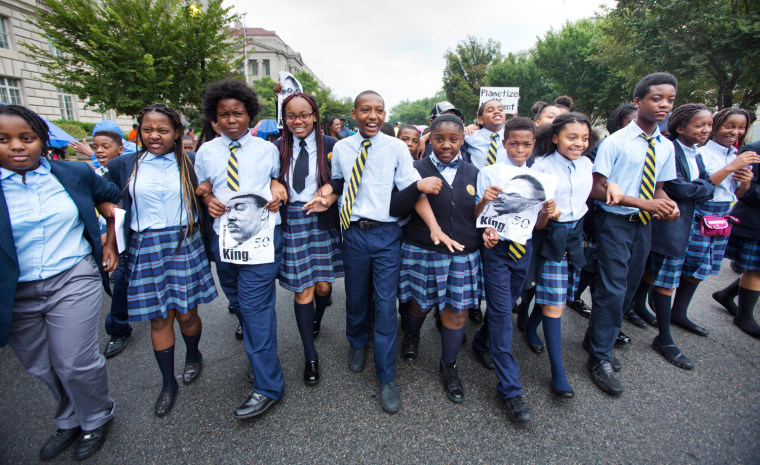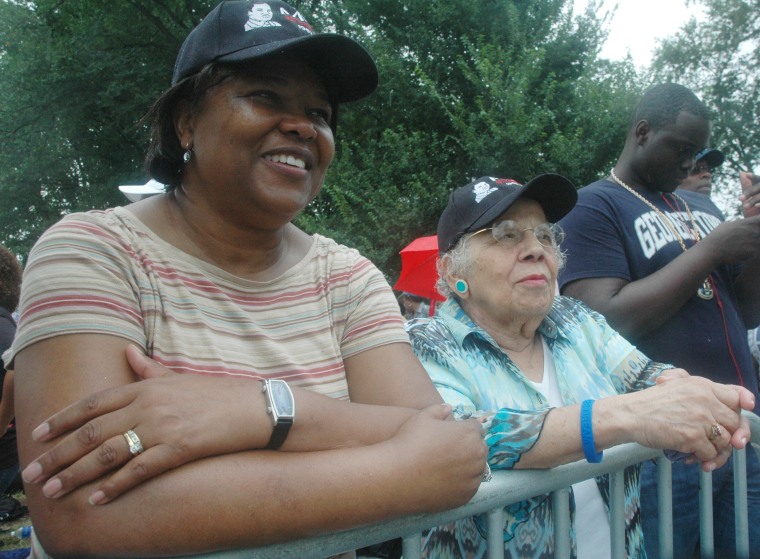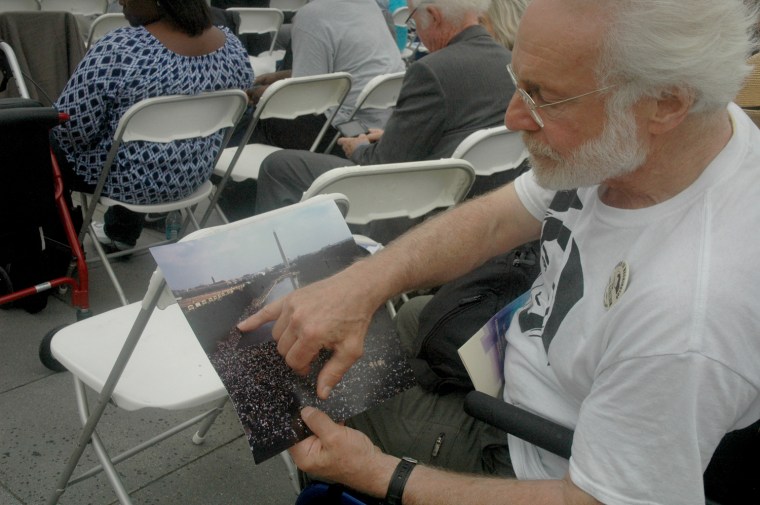
President Obama paid tribute to the Rev. Martin Luther King Jr. on Wednesday before throngs of people who descended on the National Mall in Washington, D.C., to commemorate the 50th anniversary of his "I Have a Dream" speech, declaring that "his words belong to the ages."
King's address, delivered to 250,000 supporters, punctuated the 1963 March on Washington for Jobs and Freedom. It was a watershed moment for race relations in America that has been remembered in a week-long series of events, which culminated in remarks from President Obama on the steps of the Lincoln Memorial Wednesday afternoon.
"His words belong to the ages, possessing a power and prophecy unmatched in our time," Obama said of King. "We rightly and best remember Dr. King's soaring oratory that day, how he gave mighty voice to the quiet hopes of millions."
Pointing to laws, social change, and himself as an example of how far the nation has come since King's speech, Obama was quick to highlight economic disparities between whites and blacks as proof that King's dream hasn't been fully realized.
But he chided those who dismiss the gains that have been made by the people who marched for civil rights in 1963.
"On the battlefield of justice, men and women without rank, or wealth, or title, or fame would liberate us all, in ways that our children now take for granted," Obama said. "To dismiss the magnitude of this progress, to suggest as some sometimes do that little has changed, that dishonors the courage and the sacrifice of those who paid the price to march in those years."
In an interview with PBS Newshour after his speech, Obama said he would continue to push his economic agenda — including early childhood education, an increase in the minimum wage, cutting college costs and spurring the housing recovery — as a way forward in the struggle for equal rights.
“Where Congress is unwilling to move, we’ll move,” Obama said.
“Part of what Dr. King talked about, part of what I think we have to get back to, is a recognition that the working man in Arkansas who happens to be white and the black woman in Philadelphia who wants to work but is having a tough time finding a job, that they have things in common. That in fact they can work together.”
Celebrities such as Oprah Winfrey and Jamie Foxx were among a list of speakers who addressed a nation that has made great strides in racial equality since King's "dream" speech helped bring about landmark civil rights legislation.
"Dr. King was the passionate voice that awakened the conscience of the nation," Winfrey told the people in the crowd, urging them to carry on his message. "He challenged us to see how we all are more alike than we are different."
According to BCT Consulting, the organizers of today's event, there were "give or take 100,000 folks in today's attendance."
Betty Gray, 67, traveled to Washington from Richmond, Va., for the anniversary of the speech, which she went to 50 years ago. She said she took the NAACP bus for four dollars round-trip 50 years ago and went because her mother was a civil rights activist who was honored by former President Harry Truman for helping sign black people up to vote.
"It's in my mom's memory that I'm here today," said Gray, who also attended both inaugurations for Obama.
Occasional rain showers were forecast to hit Washington throughout the day, but the overcast, humid weather didn't deter crowds: Thousands had already packed the National Mall as of early Wednesday morning, NBCWashington.com reported. Some carried umbrellas or were wearing ponchos.
At one point during the events — amid Leann Rimes' rendition of "Amazing Grace" — a rainbow appeared over the sky.
As crowds filled the Mall in the shadow of a scaffold-covered Washington Monument — still under repair from an earthquake two years ago — they passed by vendors selling t-shirts, buttons, and bells marking the anniversary. Young and old — kids on summer break, college students and senior citizens — were part of the masses.

Imogen Hutchinson, 60 — born and raised in Alabama as the daughter of a sharecropper — recalled life at the time of the March on Washington.
"I remember being afraid all the time," she said. "My parents were scared for King."
Hutchinson's friend, Reba Diggs, 81, has lived in Washington since 1951, but couldn't make the 1963 march because of health reasons.
"I was determined to come this time," she said. "I am so proud of what Martin Luther King did here."
Dianne Hardy, 68, from Maryland, had also wanted to come, but said her mother wouldn't let her.
"She thought the march was threatening," she said. "It's so awesome [to be here today]."

Peter Sussman, 72, of Berkeley. Calif., had been living in a predominantly white part of Long Island, N.Y., at the time of the march. He had just finished college at the time and upon hearing about the march, "I knew I had to be there."
"It really was a national convergence like I've never seen," Sussman said. "When I got home, my parents, who didn't think much of me going to the march, were waiting up for me because they knew having seen it on TV that it was a piece of American history that I had just experienced. They wanted to hear all about it."
Sussman returned to the Mall on Wednesday wearing the same button that was handed out to him 50 years ago, this time confined to a wheelchair due to spine issues.
"To be here today is a dream of mine," he said.
Events were planned throughout the day to mark the 50th anniversary, starting with a 9 a.m. interfaith service. Speakers, including various senators and congressmen and NAACP President Ben Jealous, were also part of the commemoration.
"As we go home today, let us remember that the dreamer was also a doer," Jealous said. "Let us not just be dreamers this day. Let us recommit to being doers."
Family members of King also spoke. Martin Luther King III, King's son, said his dad "challenged" his supporters to love all other people, regardless of who they were.
"He often talked about how sometimes we must take positions that are not safe or unpopular ... because our conscience tells us they are right, King III said.
Christine King Farris, King's sister, described the pride she felt in her brother's legacy. "The dream my brother shared with our nation and the world on that sweltering day 50 years ago continues to nurture and sustain nonviolent activists worldwide and their struggles for freedom."
Sen. Angus King, an independent from Maine who witnessed King's speech, was also among those who addressed the crowd on Wednesday.
"Fifty years ago at this place, at this sacred place, Americans sent a message to their leaders and around the world that the promise of equality, of opportunity, equality before law ... applied to everyone in this country, not just the lucky few of the right color or the accident of birth," he said.
Peter and Paul, from the singing trio Peter, Paul and Mary, got on stage to sing "Blowin' in the Wind," the 1962 Bob Dylan hit that they had sung in front of the Lincoln Memorial in 1963, turning the song into an anthem for interracial relations.
Singing it again Wednesday in the same spot 50 years later, they were joined by the parents of Trayvon Martin, the unarmed black teen whose killing in February of 2012 sparked a national debate on race relations.
Former Presidents Bill Clinton and Jimmy Carter also spoke at the ceremony, which included bell-ringing at 3 p.m. ET — 50 years to the minute after King called for civil rights with the words "let freedom ring."
"I'm thankful to Martin Luther King Jr. that his dream is still alive," Carter said.
Clinton thanked those who attended King's march.
"What a debt we owe to those people who came here 50 years ago," he said, adding that King "urged the victims of racial violence to meet white Americans with an outstreched hand, not a clenched fist."
About 50 communities and organizations across the U.S. rang bells when the clock struck 3 p.m.
Tokyo and the Swiss city of Lutry also took part in the bell-ringing, an event organizer told Reuters.
Former President George W. Bush, who wasn't in attendance, called on the nation to carry on King's legacy in a statement released Wednesday.
"Dr. King was on this Earth just 39 years, but the ideals that guided his life of conscience and purpose are eternal. Honoring him requires the commitment of every one of us. There's still a need for every American to help hasten the day when Dr. King's vision is made real in every community — when what truly matters is not the color of a person's skin, but the content of their character," he said.
The country remains deeply divided over how much progress there has been toward racial equality in the half-century since the march. According to a recent Pew Research Center poll, fewer than half of Americans believe "substantial" progress has been made toward King's dream over the last 50 years. Among blacks, fewer than one-in-three say the same.
However, in other areas such as high school completion, life expectancy and voter turnout, the gaps have narrowed or — in the case of the latter — disappeared entirely.
Yet Wednesday's commemoration takes place in the waning days of a summer in which various conversations on race relations struck a chord in the national mood.
In July, Obama delivered personal, unscripted remarks on issues of race after the acquittal of George Zimmerman in the killing of Trayvon Martin.
And earlier this month in New York City, a federal judge ruled that the controversial "stop-and-frisk" tactic used by police violated the Constitution and amounted to "indirect racial profiling."
In addition to the current and former presidents scheduled to speak Wednesday, Rep. John Lewis of Georgia addressed the crowd. Lewis was the youngest speaker at the 1963 march and delivered a speech that admonished the Kennedy administration for doing "too little, too late" for southern blacks.
Lewis was among the civil rights advocates who spoke out last weekend against the Supreme Court's ruling on voting laws as thousands retraced King's footsteps in an organized march.
"This moment in our history has been a long time coming, but the change has come. We our standing here in the shadow of Abraham Lincoln, 150 years after he issued the Emancipation Proclamation," Lewis said.
Lewis described to the crowd how in the 1960s, "black and white people could not be seated together on a Greyhound bus." King's words, he said, "captured the heart of people, not just around America, but around the world."
"Fifty years later, we can ride anywhere we want to ride," Lewis said.
The scars of racism still remain deeply embedded in American society, he said, citing Trayvon Martin's case and stop-and-frisk.
"We must never, ever give up. We must never, ever give in," he said.
Related: